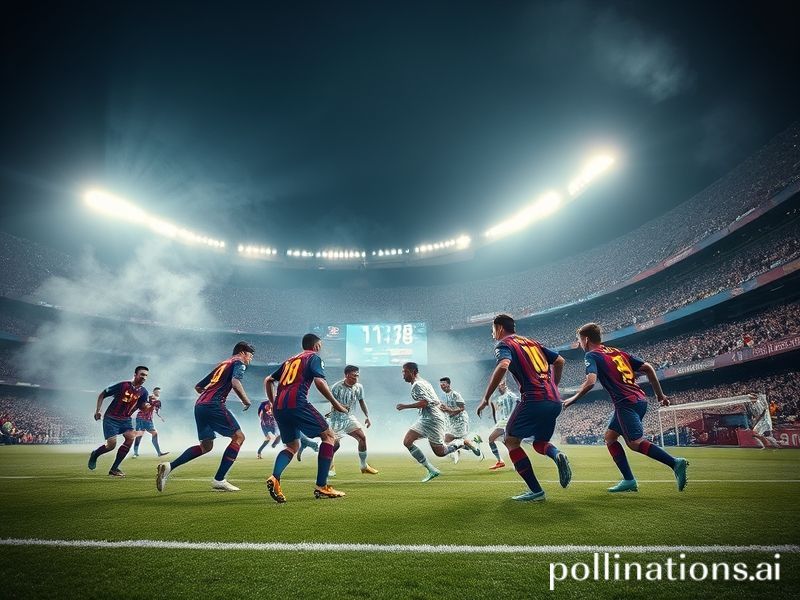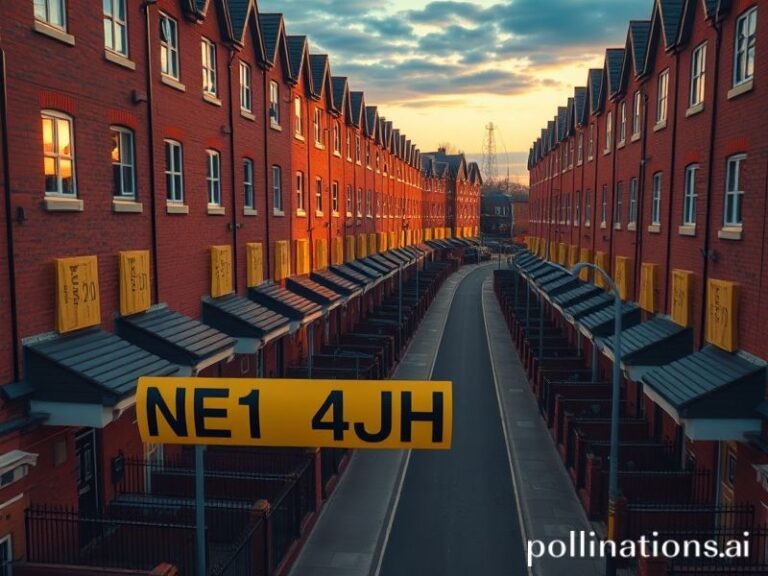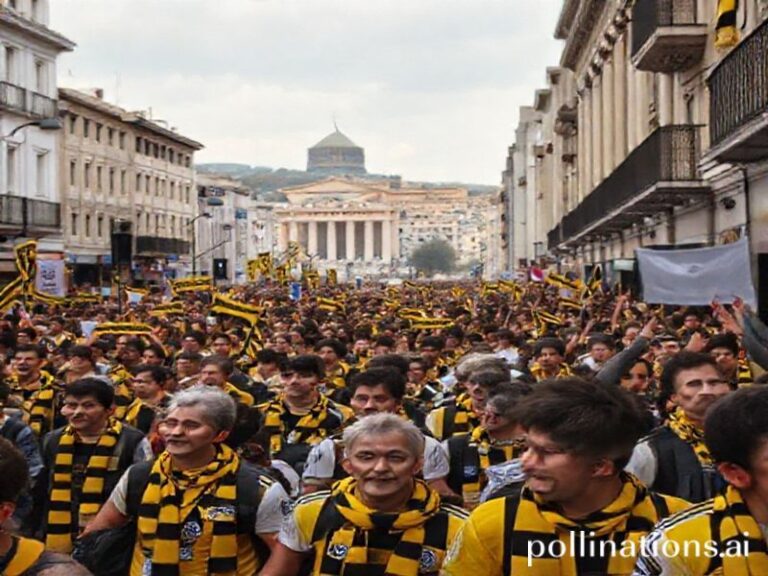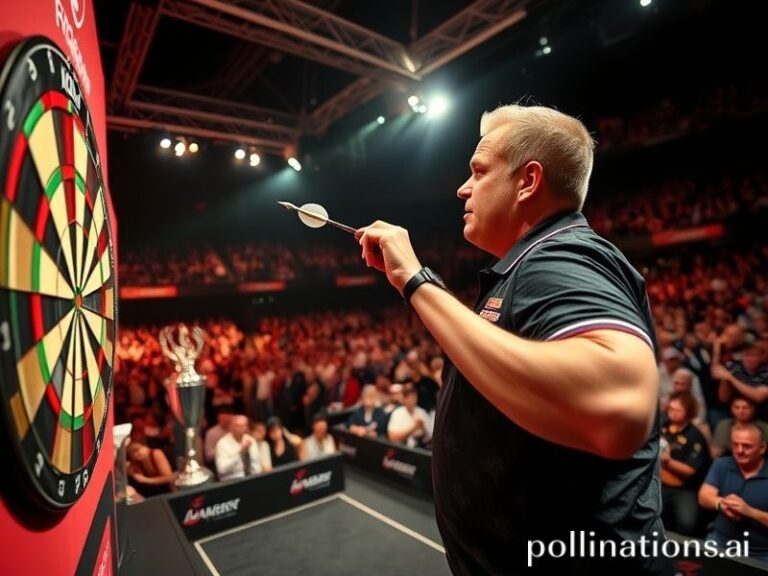Barcelona vs Real Sociedad: 90 Minutes of Global Anxiety Dressed Up as Football
Barcelona vs Real Sociedad: A Microcosm of the Modern World’s Slow-Motion Nervous Breakdown
By the time the Camp Nou lights dimmed for kick-off, the planet had already digested a full day’s doom-scroll: two wars, three election meltdowns, and one crypto-exchange founder sentenced to time-out. Yet 92,000 souls still filed into the cathedral of Catalan angst, proving that even in the end-times we insist on our regularly scheduled bread and circus. Barcelona versus Real Sociedad is, on paper, a mere La Liga fixture. On the ledger of global anxiety, however, it is a quarterly earnings call for the human condition.
From the vantage point of a press box that smells faintly of truffle fries and existential dread, the match looks less like football and more like a United Nations subcommittee on coping mechanisms. The Japanese tourist to my left live-tweets every Pedri pirouette to an audience of otaku in Osaka, while the Nigerian oil-trader in Row 3 has bet the GDP of a small island nation on the over 2.5 goals. Everyone, everywhere, is hedging against boredom and bankruptcy in equal measure.
Barcelona—club, city, ideological fever dream—enters the night in the familiar posture of a once-omnipotent empire trying to refinance its delusions. Their financial fair-play spreadsheet reads like a Greek tragedy ghost-written by Goldman Sachs. Yet here they are, still able to field a midfield conjured from La Masia and the raw hope that someone will eventually buy the naming rights to Gaudí’s basilica. Societally speaking, the Blaugrana are Europe’s cautionary tale wrapped in a viral TikTok: “We monetised our soul—here’s what happened next.”
Across the halfway line, Real Sociedad arrive as the boutique answer to late-stage capitalism. A Basque club that still insists on fielding players who can pronounce “Txakoli” correctly, they are the artisanal sourdough in a world addicted to Wonder Bread. Their wage bill is reportedly smaller than Barcelona’s annual interest payments, which should be inspirational but instead feels vaguely threatening, like discovering your minimalist friend is happier than you.
The first half unfolds with the choreographed chaos of a COP28 panel discussion. Barcelona monopolise possession the way billionaires monopolise space rockets: pointlessly but with spectacular lighting. Real Sociedad, meanwhile, press high in bursts, like Scandinavian social democracies experimenting with austerity before remembering it kills people. When Alexander Isak—on loan from his own hype—ghosts past Ronald Araújo, the stadium gasps with the collective realisation that generational wealth doesn’t always translate into generational pace.
At the 38th minute, a VAR review denies Barcelona a penalty after the referee consults a pitch-side monitor the size of a Times Square billboard. Somewhere in Silicon Valley, a start-up founder watching on a yacht yells “Disrupt!” and trademarks the phrase “Real-time moral arbitration.” The decision stands; Twitter files an amicus brief in GIF form.
Second half. The scoreboard, stubbornly nil-nil, begins to resemble the global balance sheet: skewed, opaque, and rigged by people none of us elected. Barcelona’s teenagers ping passes with the desperation of interns trying to impress a boss who just laid off their parents. Real Sociedad counter like a Scandinavian noir—methodical, chilly, lethal. In the 73rd minute, Takefusa Kubo, the Japanese Messi that Barcelona once lost on a clerical error, curls a shot that kisses the post. The sound it makes is identical to an emerging-market currency collapsing.
Finally, in the 87th minute, Robert Lewandowski—face carved from Polish granite and Goldman bonuses—stoops to conquer. 1-0. The stadium erupts with the relief of a debt ceiling raised at the last second. Fireworks bloom over the city like expensive antidepressants. Somewhere in Kyiv, a displaced Ukrainian toggles from an air-raid alert to the match stream and allows himself half a smile. Somewhere in Silicon Valley, the yacht guy loses a six-figure bet and immediately buys a carbon-offset NFT shaped like a sad polar bear.
Full-time. Barcelona climb, temporarily, above Madrid in the table; Real Sociedad retreat with the quiet dignity of a minor central bank after a failed intervention. Both sets of fans exit into a night that smells of beer, weed, and the faint metallic tang of oncoming recession. The world will keep ending tomorrow, but tonight there was a goal, a groan, and a global audience pretending everything still matters.
Conclusion: In the great spreadsheet of existence, Barcelona 1–0 Real Sociedad will be logged as three points for one side and zero for the other. Yet in the marginalia of the human race—scribbled in the footnotes of streaming data and airport Wi-Fi—it will also be remembered as a 90-minute reprieve from the algorithmic anxiety that passes for modern life. Bread and circus? Absolutely. But sometimes the circus is the only place left where we still remember how to gasp in unison.







